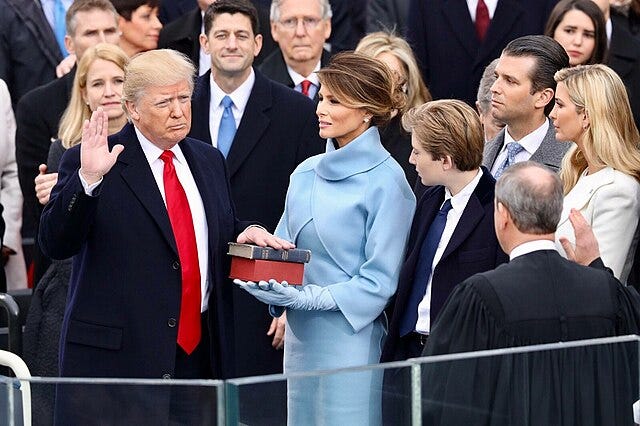Donald Trump and Supreme Court Appointments in a Second Term
An opportunity to secure a solid conservative majority for years to come
Given how prominent the presidential campaigns are, I’ll briefly leap away from my narrative of past judicial-confirmation battles.
I have a piece in the forthcoming issue of National Review (now online here) that addresses how legal conservatives should view the prospect of a second presidential term for Donald Trump. The very hopeful news (the “great promise”) comes in the realm of Supreme Court nominations. Here is an extended excerpt:
If Trump becomes president again, he could ensure a solid conservative majority on the Court for the next 15 or 20 years. An election that produces his victory would very likely give Republicans control of the Senate. They’d be in good shape to keep control for all four years of his presidency: All but one of the Republican seats up for election in 2026 is in a red state (the exception is Susan Collins’s seat in Maine), and a Georgia seat held by a Democrat is very winnable.
Justice Samuel Alito, 74 years old, would likely retire in the next year or two. Justice Clarence Thomas, 76, might join him. Or a vacancy in another seat could arise. One way or another, Trump could easily have at least two seats to fill.
If Trump were to replace any two of the five most senior justices, he would have appointed a majority of the Court’s members. Any justice Trump appoints would surely be in his 50s or younger. So Justice Kavanaugh, now 59, would be the oldest of the five Trump appointees. And if Trump has the opportunity to replace one of the liberal justices, the general ideological alignment of the Court should shift from 6–3 to 7–2.
Trump has promised to issue a list of the Supreme Court candidates he would choose from, as he famously did to secure conservative support in 2016. He can build an outstanding list from the dozens of federal appellate judges he appointed. All but a handful of these judges are in their 40s or 50s. Someone else he should put on the list is another past pick of his, Noel Francisco, solicitor general (the government’s chief lawyer in the Supreme Court) from 2017 to 2020. On top of his superb qualifications, Francisco would be one of several appealing candidates to be the first Asian-American justice.
It would be a political folly for Trump to go rogue on—to look outside the conservative legal movement for—a Supreme Court pick. George W. Bush made that mistake in 2005: His nomination of his White House counsel and close friend Harriet Miers triggered a conservative revolt that forced her to withdraw. As Bush’s subsequent, successful nomination of Alito showed, the best path to winning confirmation of an excellent conservative justice goes through, not around, the conservative legal movement. Any good nomination by Trump should be confirmed by a Republican-controlled Senate.
On his lower-court picks as well, Trump should draw predominantly from the ranks of the conservative legal movement. There is no alternative network of candidates available, and Trump would see no political upside to making risky nominations.
* * *
My piece goes on to discuss the “grave peril” that Donald Trump “would abuse his powers to undermine the rule of law.” Legal conservatives—and all other voters, for that matter—will need to weigh the promise against the peril, assess how Trump fares in other areas, and compare him to Kamala Harris.
If you’re not already a National Review subscriber, sign up now.




It's a solid article in NR